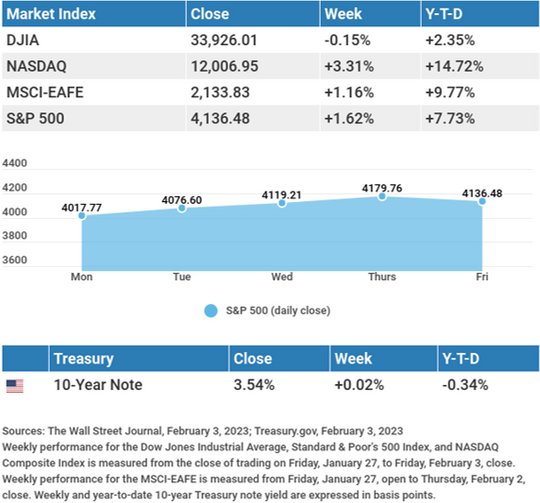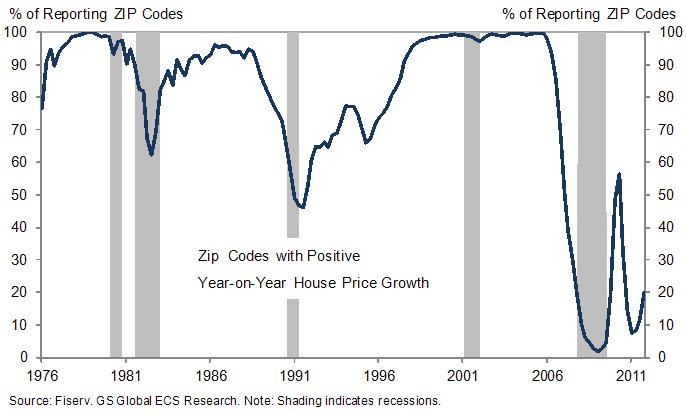By: Gerald Sparrow President & Founder, Sparrow Capital Management, Inc.
Stocks were mixed last week following better-than-expected corporate reports and increasing optimism over a slowdown in interest rates.
The Dow Jones Industrial Average edged lower, slipping -0.15%. The Standard & Poor’s 500 rose 1.62% while the Nasdaq Composite index led, picking up 3.31%. The MSCI EAFE index, which tracks developed overseas stock markets, increased by 1.16%.1,2,3

Rally Continues
Strong earnings reports and encouraging inflation data lifted stocks ahead of the Federal Open Market Committee’s (FOMC) decision on Wednesday to hike interest rates by 25 basis points. Markets rallied following the announcement, relieved that the increase was in line with expectations and buoyed by post-meeting comments in which Fed Chair Jerome Powell acknowledged the disinflationary forces in place.
Fresh earnings reports fueled further gains, with positive earnings surprises from several big-name technology companies that benefited the larger universe of Nasdaq-listed high-growth companies. Disappointing earnings from three mega-cap tech companies and a strong employment report triggered a Friday pull-back, paring the week’s gains.
Another Rate Hike
The Federal Reserve raised interest rates by 0.25%, signaling to the financial markets that it would likely hike rates by another 25 basis points at its next meeting in late March. Fed officials said the slowdown in rate hikes might provide time to assess the impact of the accumulated rate hikes. The Fed retained language in its post-meeting statement that future rate hike plans were unchanged to discourage investors’ hopes of an imminent pause in the rate-hike cycle.4In his post-meeting press conference, Fed Chair Powell reiterated the Fed’s commitment not to declare victory on inflation prematurely but acknowledged that a disinflationary trend was underway.5
PHOTO CREDIT: https://www.shutterstock.com/g/rozbyshaka
Via SHUTTERSTOCK
Footnotes and Sources
1. The Wall Street Journal, February 17, 2023
2. The Wall Street Journal, February 17, 2023
3. The Wall Street Journal, February 17, 2023
4. The Wall Street Journal, February 14, 2023
5. CNBC, February 16, 2023
Disclosure:
Investing involves risks, and investment decisions should be based on your own goals, time horizon, and tolerance for risk. The return and principal value of investments will fluctuate as market conditions change. When sold, investments may be worth more or less than their original cost.
The forecasts or forward-looking statements are based on assumptions, may not materialize, and are subject to revision without notice.
The market indexes discussed are unmanaged, and generally, considered representative of their respective markets. Index performance is not indicative of the past performance of a particular investment. Indexes do not incur management fees, costs, and expenses. Individuals cannot directly invest in unmanaged indexes. Past performance does not guarantee future results.
The Dow Jones Industrial Average is an unmanaged index that is generally considered representative of large-capitalization companies on the U.S. stock market. Nasdaq Composite is an index of the common stocks and similar securities listed on the NASDAQ stock market and is considered a broad indicator of the performance of technology and growth companies. The MSCI EAFE Index was created by Morgan Stanley Capital International (MSCI) and serves as a benchmark of the performance of major international equity markets, as represented by 21 major MSCI indexes from Europe, Australia, and Southeast Asia. The S&P 500 Composite Index is an unmanaged group of securities that are considered to be representative of the stock market in general.
U.S. Treasury Notes are guaranteed by the federal government as to the timely payment of principal and interest. However, if you sell a Treasury Note prior to maturity, it may be worth more or less than the original price paid. Fixed income investments are subject to various risks including changes in interest rates, credit quality, inflation risk, market valuations, prepayments, corporate events, tax ramifications and other factors.
International investments carry additional risks, which include differences in financial reporting standards, currency exchange rates, political risks unique to a specific country, foreign taxes and regulations, and the potential for illiquid markets. These factors may result in greater share price volatility.
Please consult your financial professional for additional information.
This content is developed from sources believed to be providing accurate information. The information in this material is not intended as tax or legal advice. Please consult legal or tax professionals for specific information regarding your individual situation. This material was developed and produced by FMG Suite to provide information on a topic that may be of interest. FMG is not affiliated with the named representative, financial professional, Registered Investment Advisor, Broker-Dealer, nor state- or SEC-registered investment advisory firm. The opinions expressed and material provided are for general information, and they should not be considered a solicitation for the purchase or sale of any security.
Copyright 2023 FMG Suite.




